ALABAMA TO ONTARIO, 1966
This is the complete
account of my bicycle camping trip, written entirely while I was on the trip, and not the
abbreviated, edited account published in the Anniston Star while
I was still traveling, which I placed here earlier. (The newspaper's editing
of my draft especially disturbed me because it subtly altered the intent
of what I had been saying. The editor evidently didn't agree with
or understand my point of view and worked to make my thoughts more conventional.)
I have selected the better version of each sentence from my two drafts,
made minor changes in wording from the original only when necessary, and
on rare occasions omitted material that I felt was undesirable or unnecessary.
Any new material is added in brackets. Because this version is longer than
the one previously published here, I have had to break it into two halves.
I was 20 years
old at the time. On the trip, I rode a 1965 Schwinn Varsity bicycle equipped
with steel fenders, a pint bottle holder, a toy-grade air pump, a cable
and spring speedometer, and an 18-inch heavy steel rear carrier with a
large reflector. My equipment consisted of two wool blankets, a plastic
tarp, clothing, simple tools, a frying pan and pot, a army gasoline stove,
a Clorox bottle for gasoline (not currently legal) and another one for
water, a telescope, and the same compass that I've carried on every trip.
The pannier bags were homemade and bigger than any others I've ever seen.
Eighteen inches long and extending to within four inches of the ground,
they were needed to carry my bulky gear. I carried $180, mostly in traveler's
checks, and my birth certificate. Even though I had no insect netting,
I camped out every night except at my sister's house. I arrived home with
$75 left after seven weeks on the road and one week spent at my sister's
house, having purchased not only food and tires but also clothing and tools.
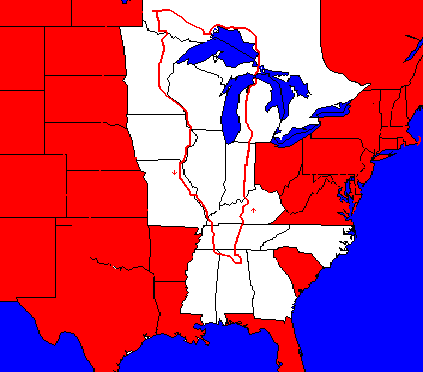 In
making this trip, I was a bit of a pioneer. While others had made trips
similar to mine before and while I have a newspaper clipping about a young
woman who made a similar trip the same year, bicycle travel was fairly
rare at that time. For instance, while in Canada, I never encountered any
other cyclists, although I talked to hitchhikers. Occasion reports reached
me from motorists as I was crossing Ontario about another male cyclist
making the same trip; however, no one had actually seen him, and I got
the impression that they had heard about me from someone else. However,
cycling was about to enter a boom, and when I returned to Canada by VW
in 1970, I saw several groups of cyclists making the trip (and huge numbers
of hitchhikers). Then in 1976, Bikecentennial encouraged large numbers
to make such a trip. In the late 70's, I met one bike traveler who said
that his trip had been partially inspired by mine. In
making this trip, I was a bit of a pioneer. While others had made trips
similar to mine before and while I have a newspaper clipping about a young
woman who made a similar trip the same year, bicycle travel was fairly
rare at that time. For instance, while in Canada, I never encountered any
other cyclists, although I talked to hitchhikers. Occasion reports reached
me from motorists as I was crossing Ontario about another male cyclist
making the same trip; however, no one had actually seen him, and I got
the impression that they had heard about me from someone else. However,
cycling was about to enter a boom, and when I returned to Canada by VW
in 1970, I saw several groups of cyclists making the trip (and huge numbers
of hitchhikers). Then in 1976, Bikecentennial encouraged large numbers
to make such a trip. In the late 70's, I met one bike traveler who said
that his trip had been partially inspired by mine.
I've included
some data at the bottom of each day's report: the towns nearest to my starting
and stopping points, the state (when it changes), the miles covered, and
the date. Three of the following pictures (the first, the last, and the
one at Maquoqueta) were made in 1966, the others date from 1970.
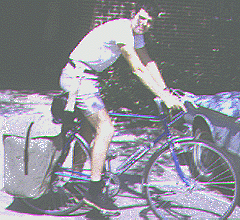 FIRST
DAY: While writing, I'm sitting on a rock ledge above the
spot where I've parked my bicycle and pitched my tent. I have four miles
to go tomorrow before I reach Huntsville. FIRST
DAY: While writing, I'm sitting on a rock ledge above the
spot where I've parked my bicycle and pitched my tent. I have four miles
to go tomorrow before I reach Huntsville.
This morning at
my parents' home on Lookout Mountain, I loaded my pannier bags with equipment
and pulled out, leaving for Canada. The question most people would ask
-- and have asked -- me is "Why go on such a trip?"
A few people would
consider a bike trip a lark, but it isn't; instead, it is averaging 10
miles an hour, 60 miles a day week after week, with every hill an obstacle
and the sun a fierce and unrelenting enemy.
Perhaps I could
say that I go for the exercise, but why go to that much trouble when I
could exercise near home? Maybe I could say I go for the scenery, but I
could go by bus and see the same landscape. It would be more true to say
that I go for the opportunity to camp along the way and to enjoy the things
I see while camping. Since I have begun writing, a fox has passed beneath
me as far as the smell of my things, and then has circled behind me, reaching
a point only 15 feet away, and scaring a chipmunk.
And yet I don't
feel that camping is the main reason why I'm going. Nor do I think that
the challenge involved is the real reason either. I feel that I'm going
in order to see this one short section of the world as an entirety, so
that I get to know it like the path that runs to the creek behind my house.
I want to understand the relationship of Port Arthur to Lookout Mountain
in the same way I understand the relationship between that creek and my
house. And to do that I can't travel by boat or train or car or plane.
I have to measure the continent with the stride of my legs.
Gadsden - Huntsville,
70 miles, May 28.
SECOND DAY:
After I finished writing last night, the fox came back again. There was
what seemed to be a den under the rocks I was siting on. I decided at the
time that either I would have to move my camp, or he would have to sleep
out for the night. Then I looked at his den. If the rest was as narrow
as the part I could see, he was probably better off sleeping out for a
change. He wasn't a very pretty fox as both ends were red and the middle
silver. I kept hoping that he'd come back, but he didn't.
In the morning,
I got up at four o'clock (with a rain crow, who also didn't sleep well),
and rode through Huntsville at five. About six, I stopped at a little creek,
had a shave and a bath, and washed my socks and dishes. While I was shaving,
I heard a loud squawk in the trees above me. looking up, I saw a hawk chase
off two bluejays and grab in his beak something smaller than they were.
Although I can only guess, I think the hawk must have taken one of their
young.
After that, I went
on and began to slowly climb a plateau and then suddenly dropped down to
Fayetteville.
Later on, I came
to a small cave next to the highway. Getting a candle from my saddle bags,
I picked my way into it until the main passage ended. I really sympathize
with the early cave explorers who had to depend on candlelight. It was
so dim I couldn't see my shoes without bending over. There was one fair-sized
stalactite in the cave, about two feet in diameter. The day after tomorrow,
I should see a real cave -- Mammoth.
I finally found
another place to stop, but not a very good one. I took it anyway because
I was afraid I wouldn't find another one. I am in a very small piece of
woods on the edge of a field, not more than 120 yards from the highway.
Huntsville - Shelbyville,
Tennessee, 71 miles, May 29.
THIRD DAY:
Last night I had the honor of having two field mice run across my blanket,
one right across my face! It is a pity that these pleasant and harmless
rodents were named after the European rats and mice. They have no relation
to the latter, nor none of the bad characteristics.
As I have been
riding my bike down the highway, I have been looking at historical markers.
The cars go by so fast that passengers are lucky to see the captions, but
I have time to read that and the first few lines. Almost always they tell
of some Union general who was defeated at such and such a point during
the Civil War. I'm wondering what I will read on the historic markers north
of the Ohio -- the birth places of these Union generals?
One of my stops
was at Stone River where I walked up part of the river to a pretty dam.
Tonight I am camping
on a long wooded hill bordered by a stream. My only neighbors are a gray
squirrel and a rain crow. The rain crow is also called the yellow-billed
cuckoo, and it makes a cry (generally all night long) between a dog barking
and a man snoring.
Shelbyville - Westmoreland,
75 miles, May 30.
FOURTH DAY:
This morning I was so cold when I got up that I had trouble fastening my
pannier bags; my hands shook too much to buckle the straps. After I got
started, my hands became so numb I couldn't operate the gears on my bike,
and my feet were so cold I could not feel the pedals. And yet I was quite
comfortable last night sleeping in only two blankets.
At noon today I
reached Mammoth Cave. I had been in commercial caves before, and so I was
prepared for what followed. I found the cave very interesting, but the
guided tour took the magic away from it. I found the little cave I visited
two days before more exciting. The commercial cave I would like to see
is one at which they would give me lights on the surface and let me go
where I want to. [Amazingly, on my next trip to Mammoth just a few years
later, the lights were left on, and tourists were free to make self-guided
tours.]
But the cave I
wanted to see the most, I couldn't get to. Floyd Collins' Crystal Cave
is believed to the longest in the world. It is also the cave of the
world's most famous cave crawler. And yet, unable to compete with the government's
Mammoth because it lacked a paved road, it folded about five years ago
and was taken over by the government, and today does not even occur on
a map of the area.
Westmoreland -
Cave City, Kentucky, 65 miles, May 31.
EXTRA ESSAY:
I thought it would be helpful to give a brief description of the equipment
I am taking on this run to Canada. My bicycle is a Schwinn 10-speed model
with dropped bars. This means that I have ten gears on my bike which I
can change by jumping the chain from one toothed sprocket to another and
that my handlebars are bent so I have to lean forward to hold them. With
this arrangement, I don't have to walk up any hills as I can simply shift
into a lower gear, and I can go downhill faster as I can lean forward to
cut wind resistance and shift into a higher gear.
My other equipment
consists of a saddle bag, two pannier bags, and the gear in them. I have
a little stove to cook on, gasoline, blankets, cooking utensils, clothing,
toilet items, writing materials, a tent, a cover for my bike, and bicycle
repair equipment.
Perhaps the most
interesting single item I carry is my gas stove. After I pump it awhile
to get up pressure, I open a little valve that spits gasoline until I light
it. Then the fun begins. Flames pour out about two feet high until the
stove is hot enough to maintain a two-inch high blue flame. The gas stove
has only two temperatures -- high and wow! High will burn through an aluminum
pot in three minutes; I don't know what wow! will do.
FIFTH DAY:
The weather was again cold. I realized, though, that it would be because
of the temperature yesterday afternoon, so I wore warmer clothing last
night [in other words, I slept in my long pants and shirt] and had no trouble.
A shopkeeper told me today that it had gone below freezing, and that one
man had to scrape ice off his windshield. A fine night to be sleeping in
two blankets!
One of my amusements
along the way is to go into a store and buy a loaf of bread. Then I take
it outside, sit down and eat it without drinking any water. The adults
usually watch me silently, intently, but the kids ask, "Are you going to
eat all that?" and then, "I bet you can't do it." As I have gone north,
the size of smallest loaves has increased to a pound and a quarter and
the price to 25¢. Today, since I had little to eat yesterday, I ate
two such loaves, five eggs, half a pound of pork, and a can of corn. [Later
the loaves increased to a pound and a half, and I started regularly eating
two such loaves a day after I reached Michigan.]
A short while ago,
while scouring my pans with mud, I saw a small field mouse come to the
water and get a drink. Through my spy glasses, in the magnification, he
looked somewhat like a baby rabbit, with his cute ears and twitching nose.
[Due to road construction, I was forced east to Bardstown. However, I did
get through one detour by wading my bike through the stream.]
Cave City - Bardstown,
88 miles, June 1.
SIXTH DAY:
This morning, as I entered Louisville, I found out where the nearest bike
shop was and went there to buy a new tire to replace my rear one, which
was cracked from riding with too little air pressure [the pump I carried
could only manage 40 psi, and gas station pumps were not always suitable].
The lady who owned the shop was impressed with the idea of my journey,
made a special trip to get a tire for me, and then only charged me the
wholesale price! [At that time, only the largest bike shops would stock
the 27-inch tires that my Schwinn used; almost all bikes used 26-inch tires
at that time.]
As I have been
nearing Louisville, I have been seeing more and more bicycles. In Bardstown,
for instance, I saw over 40 on the streets within a two-mile drive. And
most of the bikes were in good condition, with 3-speeds and 10-speeds everywhere,
and even a tandem. All of these, however, were being ridden by children.
Today after I left
the bike shop, I decided to pull over and check my map. As I did so, a
man pulled in front of me in his car and got out and came over. He asked
me where I was from and where I was going. I had already heard that bicycle
licenses were required in Indiana, and I was afraid that he was a policeman
questioning me about that or some other local ordinance. I answered him,
and he gave me his name, asked me mine, and held out his hand to shake.
"Surely," I thought, "this can't be a local politician." He explained that
he was Lawrence Routt, president of the local wheelman's association. A
trip like mine was nothing new to him. He had ridden his bike to Canada
before and was going this summer. Another member of his club had made two
trips to Miami, and on one of those trips, he had ridden for 48 hours without
getting off his bicycle. [I did not get the impression that they were making
camping trips.]
I crossed the Ohio
River at noon today. So far, I have crossed the Tennessee, the Cumberland,
the Stone, and the Green Rivers, but the prettiest of them was the Ohio.
Bardstown - Scottsburg,
Indiana, 44 miles, June 2.
SEVENTH DAY:
Indiana is rather flat, so I have been traveling in high gear most of the
day and have gone 85 miles. I have now traveled 500 miles since starting
this trip.
In order to give
an idea of what 500 miles means, I will explain my daily schedule. I wake
up at 4:30. I change whatever clothes need to be changed in the cold morning
air and finish getting my gear together. At five, I start out, and ride
40 miles from then until eleven, spending about three hours riding and
the other three resting or eating my lunch. In the afternoon, from eleven
to four, I try to cover at least 32 miles, riding about three hours. At
four, I should stop, cook dinner, wash my dishes, write some, and go to
bed at 7:30.
This schedule is
hard to keep, however, I may find too many places of interest to stop,
or I may just ride all day long if there is nothing worth stopping for.
Then, in the afternoon, while I am supposed to camp at four, I might not
find a place until five or six. And if I stop so late, I usually have to
do without eating.
Sometimes, because
of hills or an adverse wind, I have to ride all morning or all afternoon
without stopping.
Is there any advantage
to such a system? Yes, it gives me one day out of the week to rest. However,
I have never taken that day, and I probably never will. [My intention at
the start of the trip had been to average 60 miles a day, stopping early
in the afternoon. However, I found myself bored with this scheme, so I
started riding all day with the goal of 70 mpd and one day a week of rest.
I was fairly correct about never using rest days. I took none on this trip
and only a few on others. On the other hand, I have tended to ride later
and later into the evening over the years.]
Scottsburg - Greenfield,
85 miles, June 3.
EIGHTH DAY:
It is early morning of the ninth day, and I am eating my daily loaf of
bread beside a small lake in northern Indiana. I did not have an opportunity
to write the previous day for reasons which I will give.
Yesterday morning,
I woke between four and five and started out. Soon afterwards, I noticed
that my watch had stopped, not because it was broken, but because I forgot
to wind it. This is the second time this has happened on the trip, and
my letting the watch run down is a good sign of how preoccupied I am with
traveling. The last time I had this problem was on another touring trip
like this to the Smokies.
Indiana was as
flat as a road bed, and the wind was pushing north, so I rode easily all
day long until I reached my usual stopping time. The time was right, I
had found a good place to camp, and I had covered more than the necessary
number of miles, yet I didn't want to stop. I finally figured out why before
I reached the next town, and the clock there confirmed it -- I had reset
my watch to Eastern rather than to Alabama time. So I decided to push it
and try camping at the Chain O'Lakes Park that night, and I rode three
more hours.
When I reached
Chain O'Lakes Park, Indiana, I was too tired to make it to the campgrounds,
and I stopped on a section of farm that had been taken over by the park.
It was sad there, with the ruins of the farmhouse about me, the now useless
shrubbery, the kids' swing in the big tree, and the windmill still going
around over my head. I had never known these people and probably would
have had little in common with them, and yet the place seemed melancholic
without them. As I was about to pen a few immortal words on this subject,
I was attacked by a swarm of mosquitoes. As I climbed the tree with the
swing in it, I thought, "Now if each mosquito gets one drop, what will
be left of me in the morning?" I climbed back down and hid in the blankets
and somehow survived the night.
Greenfield - Chain
O'Lakes SP, 117 miles, June 4.
NINTH DAY:
On this day, I left Indiana and felt wonderful about doing so. The very
things that made farming good in Indiana -- flat land and rich soil --
have made it farmable to the extent that there are few wooded areas. Alabama
has so many of its beautiful woods only because the land is not farmable.
To me, Indiana was the most boring state I've been through -- nothing but
plowed fields.
To celebrate my
arrival in Michigan, I promised myself I could have 15¢ worth of anything
I wanted to eat or 50¢ worth of any food that was fairly economical.
I finally chose a 39¢ coffee cake.
Last night I again
slept with the mosquitoes. I chose my place carefully, early in the day
[the town park at Athens, Michigan, where I cooked my meal with picnickers
before camping.]. But at night, it was horrible. I hurriedly threw my blankets
on the ground, lay down, and wrapped them around me. From inside, I could
hear the swarm around my ears all night. The heat built up, and the sweat
running down my legs felt like mosquitoes which had gotten inside. If I
moved much, I created openings where they could come in. After an hour
and a half of this ordeal, I finally fell asleep.
In the morning,
I had to throw my things together and run. They bit me so many times that
I lost all control or judgment. Now my clothes have large splotches of
blood over them where some of the mosquitoes were squashed.
Chain O'Lakes -
Athens, Michigan, 66 miles, June 5.
TENTH DAY:
I'm sitting in a small clearing in a woods between two housing divisions
outside Grand Rapids, Michigan. I try to get as close to a large city as
possible, so I can rush through it early in the morning.
A little while
ago, I changed into clean clothes. As I was doing so, a raccoon came out
of the woods straight towards me until he was within five feet. Then he
realized his mistake and walked away very quickly. I never see wild animals
at home, as I am doing now. I suppose it's because I make too much noise
walking around.
In changing clothes,
I put on long pants and a shirt and some insect repellent. Right now, though
the mosquitoes are numerous, they aren't bothering me much, which is important:
if I can't cope with the mosquitoes, I can't go on, as I will be camping
in state forests the rest of the way to Canada.
But right now,
everything is fine. I've got on clean clothes, I'm freshly shaved, my hair
looks decent, I'm not sunburned anywhere, and I'm eating my dinner of oatmeal
and mashed potatoes (I couldn't find a store). In short, I feel as good
as the day I saw the fox at Huntsville. The camping makes or breaks the
trip, and after a few more camps like this one, I will be doing fine.
Athens - Grand
Rapids, 71 miles, June 6.
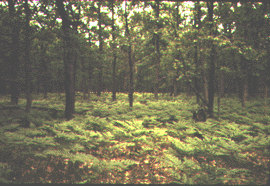 ELEVENTH
DAY: Today I set up my tent for the first time. [It was a
tarp tent, lacking mosquito protection.] After I left Grand Rapids, I went
through some small towns until I crossed the Muskegon River and entered
a series of small forests. About 2:30 today, it began to rain, and so I
only rode an hour longer before I stopped. ELEVENTH
DAY: Today I set up my tent for the first time. [It was a
tarp tent, lacking mosquito protection.] After I left Grand Rapids, I went
through some small towns until I crossed the Muskegon River and entered
a series of small forests. About 2:30 today, it began to rain, and so I
only rode an hour longer before I stopped.
Most of today,
I have been traveling through state and national forests. It's very pretty
around here, so when I had to stop, I was not disappointed. The trees here
are a kind of small green pine, like the ones often sold at Christmas,
and they are the first pines I've seen in several hundred miles. The only
wildlife seems to be some kind of warbler I haven't yet identified, and
a little skinny red form of chipmunk, one of which practically walked into
my tent a few minutes ago. He was a sort of daring little fellow, with
his big cheeks bulging with some kind of food and his tail sticking straight
into the air. He and his comrades fairly cover the area. They sound like
a flock of birds with their cheeping.
Grand Rapids -
White Cloud, 64 miles, June 7.
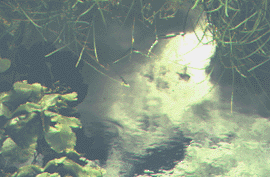 TWELFTH
DAY: Here in Upper Michigan, the only soil is a sand called
blow sand, and it is so poor that it won't grow crops without fertilizer.
The snow piles so deep in the winter that it covers the cars, and it often
keeps snowing, as it did this year, until May. As a result, there aren't
many farmers, and the principal crops are lumber and Christmas trees. TWELFTH
DAY: Here in Upper Michigan, the only soil is a sand called
blow sand, and it is so poor that it won't grow crops without fertilizer.
The snow piles so deep in the winter that it covers the cars, and it often
keeps snowing, as it did this year, until May. As a result, there aren't
many farmers, and the principal crops are lumber and Christmas trees.
The rainfall isn't
very much either, only about 24 inches a year. I was told that there was
only 4/10th of inch of rain this May. And yet there are lakes and streams
everywhere, and when I go into the woods, the ground is sure to be wet.
The reason for this is that the glaciers scraped off the ground in such
a way that it drains poorly. Even where there aren't lakes, I see large
areas of land that drain towards their centers, like sinks. In the White
Cloud region alone there are l56 lakes and 46 streams!
One of the amusing
things to do around here is to cross a river. I'll come to a sign that
says _____ River, and the I'll cross a creek as wide as a bed. Finally,
I found a real river. The sign read "Manistee River," and the stream looked
as if it was about two or three miles across. I was really thrilled. Four
mile up the road, I crossed it -- as wide as a bed with a night table beside
it.
White Cloud - Traverse
City, 74 miles, June 8.
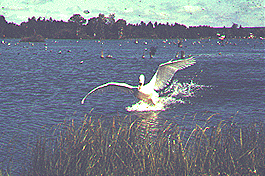 THIRTEENTH
DAY: I entered Traverse City this morning at six with an
ice-cold rain beating on my face. I had been hoping to see lovely Lake
Michigan all day long, but instead all I could look forward to was rain.
Lake Michigan, which I was seeing for the first time, was an angry green
froth with no beauty to it. THIRTEENTH
DAY: I entered Traverse City this morning at six with an
ice-cold rain beating on my face. I had been hoping to see lovely Lake
Michigan all day long, but instead all I could look forward to was rain.
Lake Michigan, which I was seeing for the first time, was an angry green
froth with no beauty to it.
By afternoon, the
rainy weather was over, and I was no longer cold. I rode into Charlevoix.
The harbor there, for color, is as pretty as any I have ever seen. The
sky and waves at Traverse were green; here they were deep blue: the deepest
blue I have ever seen.
The city is unique,
with the shopping area on a little arm about 75 yards wide between Lake
Michigan and Lake Charlevoix.
When I stopped
this evening, I had my first rice pudding of the trip, made with powdered
eggs and brown rice. I have been cold and wet and hungry all day; hungry
enough to eat six pounds of food.
Traverse City -
Charlevoix, 65 miles, June 9.
FOURTEENTH DAY:
This morning I went by a sign announcing a nuclear plant, and when I went
down to the lake side, I saw its globe in the distance. I had slept within
fallout distance of it the night before.
I have been excited
all day. Today I leave the peninsula! Finally, as I pedaled over one more
hill, I looked at the speedometer -- 1,000 miles. Then I looked up and
saw the bay. Half an hour later, I was on the other side by way of bus.
The five-mile-long Mackinaw Bridge is said to be one of the wonders of
the world. I think I yawned on the way over.
Upper Michigan
is beautiful. I stopped in a fir woods that had coated the ground thick
in leaves for so long that they were turning to peat. And now I am going
to sleep on that inches thick, insulated mattress.
Charlevoix - St.
Ignac, 60 miles, June 10.
FIFTEENTH DAY:
It was so cold last night that when I awoke this morning there were no
mosquitoes. You cannot appreciate this unless you know how much cold these
Michigan mosquitoes can take.
I had a nice ride
up to Sault Ste. Marie, Ontario, as I was no longer rushed and as there
were only woods and more woods to ride through -- and no traffic. I saw
my first deer on the way, male and female; but I didn't see them while
I was walking, so there wasn't much thrill in the encounter.
And now the poor,
lone, tired traveler is shivering in the cold afternoon air as the sun
sinks and as he stands looking over the blue waters towards his native
land, his fierce blue bicycle beside him. And as he stands there meditating,
two large, warm, quivering tear drops slide slowly down his cheeks, and
he mutters to himself, "Ah Michigan, if I ever forget thee, may I, may
I forget to brush my teeth."
St. Ignac - Sault
Ste. Marie, Ontario, 58 miles.
SIXTEENTH DAY:
Last night I went to bed at 10:30. This morning I woke up at six and got
up at eight. And now I'm back in bed. So, you're thinking, "That going
to bed at seven, getting up at four, and riding 70 miles a day was finally
too much for him."
So I think I should
explain. The earliest I could stop after leaving Sault Ste. Marie last
night was at eight o'clock, and, it took me from eight until ten to cook,
eat, and get ready for bed. Also, the clocks are different here, so that
ten here is eight at home, and, my rising time of six is four there. As
far as staying in bed, it's raining now, and I have some letters to write.
But I could start
out in spite of the rain. It only falls when the wind blows, and I suspect
the real rain is over, and this is only water shaken from the trees. And
none of my things have been injured by the rain except for the trash, which
only means that I can't read the French labels on the boxes.
Coming up to Canada,
though, I had allowed time to rests which I never took. So, now I am taking
that time out writing and listening to the rain on my tent.
Sault Ste. Marie
- Batchawaha Bay, 23 miles, June 12.
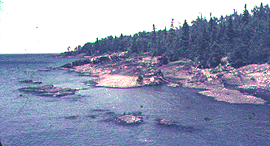 SEVENTEENTH
DAY: Yesterday and today I have been passing through some
of the prettiest country I've seen. Picture it: on one side of the road
-- steep rugged hills like little mountains, each with red rock cliffs
topped with firs, maples, and birches, with brooks and creeks gushing out
here and there, and maybe a waterfall half or completely hidden; and on
the other side, Lake Superior, now blue, now green, stretching from cliff-banked
shores to a misty haze in the distance. SEVENTEENTH
DAY: Yesterday and today I have been passing through some
of the prettiest country I've seen. Picture it: on one side of the road
-- steep rugged hills like little mountains, each with red rock cliffs
topped with firs, maples, and birches, with brooks and creeks gushing out
here and there, and maybe a waterfall half or completely hidden; and on
the other side, Lake Superior, now blue, now green, stretching from cliff-banked
shores to a misty haze in the distance.
Yesterday afternoon
I waded out into the lake, stepping on rocks that had been wave and sand
tumbled till each was smooth and polished, and felt the coolness of the
water, last night I sat and watched as the sun turned the lake red, this
morning I rode beside the water, a misty fog, and this afternoon, I stood
on a ledge jutting over the green water below.
As I ride through
these birch, maple, and fir woods, inhabited by a handful of people, I
ask myself, "Don't you wish you were back at home where you could take
things easy?" And the answer comes back a laugh.
Batchawaha Bay
- Montreal River, 38 miles, June 13.
EIGHTEENTH DAY:
For the two weeks as I pedaled from Alabama to Canada, I was a traveler.
Now I'm a camper. Every day I travel so few miles that I am ashamed to
record the figure -- but I am seeing Canada.
The road runs 450
miles from Sault Ste. Marie to Port Arthur and, in that entire distance,
live only a few thousand people. The reason is the same as in Michigan
-- the cold. Here, 130 miles out of Sault Ste. Marie, the temperature goes
down to -30º Fahrenheit in the winter. In White River, 80 miles ahead,
it has gone down to -72º Fahrenheit.
Riding down the
highway, I am on the edge of a wilderness. Once today I surprised a moose
eating grass along the road. He took to the woods, and. so did I, catching
him as he paused the other side of a lake. If I had been a hunter, I could
have shot him, but where is the glory in such an act? It would have been
like shooting some farmer's cow.
Montreal River
- Old Woman Bay, 55 miles, June 14.
NINETEENTH DAY:
I'm writing this on a flat rock on the shore of Catfish Lake where I've
come to try to escape the mosquitoes and black flies before bundling up
for the night. The lake is rather choppy now, with the pipe stems jerking
this way and that with each wave. The late afternoon sun (it is now nine
o'clock) is slowly turning the rocks on the opposite shore orange.
Today I surprised
another moose as I rode down the highway, this one as tall at the shoulders
as I am. I ran after it into the woods, but all I heard was a faint movement
some ways off. The moose are supposed to be able to travel 35 mph through
thick woods, and after seeing these two moose run, I believe it.
About nine this
morning, I rode into the town of Wawa (population 4,500). Although the
town is only three quarters the size of Jacksonville, it has more than
a dozen large motels and a fairly large shopping area. It is one of the
main jumping off places for hunting and fishing expeditions. Six years
ago, it didn't even have a highway leading into it. [My statement is probably
not entirely true; however, the highway between Sault Ste. Marie and Wawa
was not finished until 1962.]
Old Woman Bay -
Catfish Lake, 30 miles, June 15.
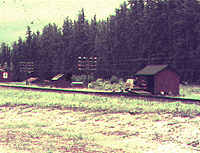 TWENTIETH
DAY: This morning I stopped by a stream to cook potato soup
and oatmeal for breakfast because I was hungry and too cold to continue
riding. As I was eating two chipmunks were scampering and chirping on the
rocks between me and the highway. They were much prettier than the ones
I saw in Michigan being partially gray with sides the color of golden roasted
marshmallows. TWENTIETH
DAY: This morning I stopped by a stream to cook potato soup
and oatmeal for breakfast because I was hungry and too cold to continue
riding. As I was eating two chipmunks were scampering and chirping on the
rocks between me and the highway. They were much prettier than the ones
I saw in Michigan being partially gray with sides the color of golden roasted
marshmallows.
Later today I met
with small puffy clouds that would rain for five minutes and then hurry
on. Twice I had the experience of being rained on with a cloud just having
passed me and none overhead. The only explanation I can give is that a
freak wind slowed the falling of the rain so that it fell where the cloud
no longer was.
One of the clouds
rained fiercely enough to force me, drenched, into a cedar woods. It was
rather nice there, with the moss covering the ground, rocks, trees, and
all, several inches deep.
Catfish Lake -
White River, 40 miles, June 16.
TWENTY-FIRST DAY:
I stopped and bought my usual loaf of bread at one today, and then rode
to the side of a large lake to eat it. Afterward, I went down to the lake
to scour my dishes with mud, and in picking my way across the large rocks
there, I tilted my pan too far forward and lost my fork and spoon in the
water. I sat by the water for a minute thinking. The utensils, after going
into the water, had hit a large rock and slid out of view. The rock I was
on was steep and the water was over two feet deep, so there was no possibility
of reaching them. Finally, I took off all but my pants and stepped in after
them. I finally found them, the spoon under one rock and the fork under
another. Then I climbed back out. Although the sun is too weak here to
give anyone a tan, it did manage to dry my clothes before I had finished
washing my dishes.
[On this evening, I chose to camp in a little Spruce woods on low-lying
ground before I reached Marathon. The mosquitoes were so thick around me
that it was impossible to look up for more than a second. It was like the
TV commercial where the man puts his arm into a cage filled with them.
This was in spite of my having put on repellent and spread my blankets
around (they attracted hordes due to my smell and being warm from the sun).
After half an hour, I could no longer see the mosquitoes due to an even
greater number of black flies. The black flies were worse than that mosquitoes
because they 1) crawled inside my clothing and blankets to bite and 2)
left bloody marks wherever they bit.]
White River - Marathon,
54 miles, June 17.
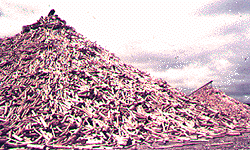 TWENTY-SECOND
DAY: I ate dinner at one o'clock today while watching the
lumber operations at Marathon, halfway between Sault Ste. Marie and Port
Arthur. The bay there is beautiful, with the deep blue of Superior contrasted
to the green of the woods on steep hills that go down to the water's edge
and on in, making hump-shaped, wooded islands. TWENTY-SECOND
DAY: I ate dinner at one o'clock today while watching the
lumber operations at Marathon, halfway between Sault Ste. Marie and Port
Arthur. The bay there is beautiful, with the deep blue of Superior contrasted
to the green of the woods on steep hills that go down to the water's edge
and on in, making hump-shaped, wooded islands.
As I have been
riding the last few days, I have been noticing logs tied together across
the streams to keep the logs being floated down from beaching in the shallows,
and they were here too, keeping acres of logs from floating out into the
lake.
In front of me
were three huge piles of logs, piled like sand in a sandbox. There was
a gray line of last year's logs on the side of each pile, while this year's,
golden, made up the mass. Even as I watched them, they would tumble off
the giant lifts, one by one.
In the afternoon,
I made myself an agreement to use one hour each day to see the woods better,
provided I didn't waste it by resting, because I have been sticking too
close to the highway. On my hike, the mosquitoes made sure I didn't stop,
and I used the time to climb a steep hill, covered with evergreens and
inches deep moss and, in places, with stretches of sandstone rock. From
the top, I could again see Superior stretching out to a haze, the small,
steep, rock and tree covered islands, and the forests between me and the
lake.
Marathon - Terrance
Bay, 50 miles, June 18.
TWENTY-THIRD DAY:
Tonight I was slower than usual in cooking my supper. I made French toast,
using my third loaf of bread for the day and plenty of butter. [The story
of how I got this food is interesting. I stopped at a gas station
for water, and the young attendant offered me the grub his dad had left
over from a camping trip, but all that was left was butter, a dried-up
loaf of bread, and a dozen eggs. He was disappointed, but I wasn't.
"Looks like French toast!" was my comment.] As I packed my pannier bags,
so I would be ready to leave quickly the next day, drops of rain began
to fall. I still had to burn my trash, though, and did so on a strip of
abandoned highway. More and more rain fell. I covered my bike with plastic
and my blankets with my tent. By the time my garbage finished burning,
the water spots on my shirt began to blend solid. I grabbed tent, blankets,
and tent ropes and ran for the woods. I picked out two trees and stretched
the rope between them. Then it really began to rain.
I threw my blankets
under where the tent would be and draped it over the rope. Hail the size
of marbles began to fall. Wincing each time I was hit, I tied the tent
corners down and dove underneath. The ground was wet before I put my tent
there, the blankets were wet before I laid them down, and I was wet before
I got into them.
"Well, at least,"
I thought, "I won't be bothered by mosquitoes." [I was too optimistic.]
Terrance Bay -
Gravel River, 60 miles, June 19.
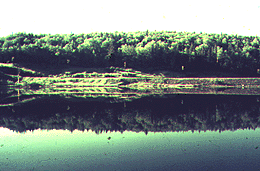 TWENTY-FOURTH
DAY: The road runs 440 miles from Sault Ste. Marie to Port
Arthur and in that distance over which I've traveled, live fewer people
than there are in Anniston. TWENTY-FOURTH
DAY: The road runs 440 miles from Sault Ste. Marie to Port
Arthur and in that distance over which I've traveled, live fewer people
than there are in Anniston.
The largest metropolis
is Wawa, 4,500, and no other city has more than 3,000 inhabitants. There
are 10 towns along the road, and White River is, by far the largest with
1,000. I passed through some of these towns without ever knowing they were
there.
Between Sault Ste.
Marie and Marathon (half the distance), I didn't see a single year-round
dwelling near the road. From Marathon on, it has been more settled. but
it wasn't until I passed Nipigon. 70 miles from Port Arthur, that I began
to run into farm country. There I saw the first cows that I've seen since
entering Canada.
The countryside
in this area is much like Alabama, with small farms scattered here and
there among second-growth woods. I have wanted to turn back home before
on this trip, but when I saw the first fences, I wanted to turn back to
the forests of Canada.
Gravel River -
Loom, 66 miles, June 20.
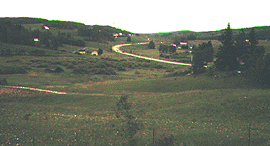 TWENTY-FIFTH
DAY: In making the Trans-Canada highway, it was often necessary
to blast gaps through hill and mountains to keep the road from winding
too much or from being too steep. At one point along the route, I came
to a cliff-covered mountain extending right into Lake Superior -- the engineers
had to cut a gap more than 100 feet deep there. TWENTY-FIFTH
DAY: In making the Trans-Canada highway, it was often necessary
to blast gaps through hill and mountains to keep the road from winding
too much or from being too steep. At one point along the route, I came
to a cliff-covered mountain extending right into Lake Superior -- the engineers
had to cut a gap more than 100 feet deep there.
The space over
which I'm now swinging my feet is such a hole, but in this case, only about
30 feet deep. It's just beginning to grow dark and, as I sit here, I watch
the trucks with their lights come up, pass under me, and grow smaller as
they move down the purpling highway, their red lights fading slowly in
the distance.
Today is the longest
day of the year. Here in Canada, this means that it is light at four, the
sun rises at five, sets at nine, and it gets dark at ten. There are 18
hours of light each day, and 16 hours of sunlight. Unless it is early morning
or late afternoon, I find it impossible to tell time by the sun as it doesn't
seem to vary in highness or in brightness during most of the day.
Loom - Shabaqua,
65 miles, June 21.
TWENTY-SIXTH DAY:
For the last week, I've been trying to find a book to read in my spare
time. I've been in dozens of stores selling books, but the most literary
authors I've seen have been Ian Fleming, Edgar Rice Burroughs, and Nero
Wolf. I've heard students at Jacksonville complain because they couldn't
find good books, but they haven't seen the selection here. In Port Arthur,
I finally found my book -- Chaucer's poetry. I already have a book of his
poetry, but it seemed sort of fitting to read about his pilgrimage as I
go on mine.
And so, when I
stop for a rest, I pull out the book, and begin to read the stories of
my fellow travelers of 500 years ago.
Shabaqua - English
River, 70 miles, June 22.
TWENTY-SEVENTH DAY:
After I finished my dinner of an omelet, bacon, and rice pudding an hour
and a half ago, I walked down to the creek below to look for moose. While
I was in the valley the creek runs through, I didn't see any, but the ground
was covered with hoof prints. Some of the tracks were fresh, and I noticed
they were sunk as much as five inches into the soil while my shoes only
sank a quarter of an inch.
As I started to
follow the track farther, it began to rain. By the time I got back to my
bike, my book and maps were covered with a thin layer of water, and my
blankets had begun to grow darker from absorbing the rain. I covered everything
but not myself, being wiser to the weather now. Sure enough, in ten minutes
the rain was over. I'm siting at this moment on a large rock formation
above my camp, swatting my constant companions, the flies and mosquitoes,
and trying to dry off in the nine o'clock sun.
[While I was pushing
my bike to the road the next morning, my hand began hurting. I looked
down and saw a dozen mosquitoes all biting the same spot!]
English River -
Dimworic, 65 miles, June 23.
TWENTY-EIGHTH DAY:
Tomorrow I enter Kenora and finish my run of the King's Highway No. 17.
It is an interesting highway. In the 750 miles, I have gone along it, I
have run on everything from a first rate highway to a dirt road. [The highway
was being rebuilt, and there were no construction bypasses. I rode on 50
miles of gravel.] The most unusual feature is that 3/4ths of it is through
wilderness.
Often I would hit
a bit of farmland and stop and ask some gas station attendant, "How far
does the country continue like this?" And he would answer, "Well, if you
go down the road about six miles, you'll run into . . . but after that
nothing."
Nothing! Rock and
tree-covered mountains, streams, waterfalls and lakes, beavers slapping
their tails, a wounded bear running across the road on three legs, a moose
half hidden in the water.
Nothing! It makes
the word sound magical and attractive. Miles and miles where no one lives.
"Nothing?" I would
say. "Then that's where I want to be tonight."
Dimworic - Vermillion
Bay, 69 miles, June 24.
ALABAMA
TO ONTARIO, PART II
|